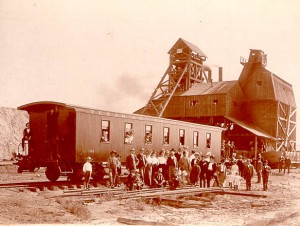 By 1915 Thurber, TX existed as the largest producer of coal in Texas. It supplied a dozen railways with coal, paved much of the state with brick, and was the largest city along Interstate 20 between Ft. Worth and El Paso. And every bit of the town (from scratching post to hitching post, from pew to crapper) was company owned by Texas and Pacific Coal Company.
By 1915 Thurber, TX existed as the largest producer of coal in Texas. It supplied a dozen railways with coal, paved much of the state with brick, and was the largest city along Interstate 20 between Ft. Worth and El Paso. And every bit of the town (from scratching post to hitching post, from pew to crapper) was company owned by Texas and Pacific Coal Company.
Yet by the 1930’s Thurber was gone, and its success began to unravel during the winter of 1921-22. At their peak, company towns across the nation hosted 3% of the population. But were these towns a blight? or progressive beacons? Was Thurber a bastion of enlightened industrialist Paternalism or a cesspool of oppressive and monopolizing Capitalism?
Is a town with no municipal government, no politics and no taxes a blessing or curse? I have to admit, on the surface this sounds like heaven to the libertarian part of me (as well as the redneck and granola). But then again, the void of government in Thurber was filled by the Company.
Sure you could take a crap in a state of the art indoor commode, but any and all creative endeavors undertaken within its sacred walls belonged to the “Man.” The washroom door might as well included a cross-stitched plaque, “material and creative rights to all processes contained therein property of Texas and Pacific. Now you’re cooking with gas!”
Thurber was the first completely electrified town in the United States with its own power plant built in 1895. By it’s prime in 1915 every home included plumbing, power and natural gas heat. Sounds spendorific to me! But these company town modernizations came with a cost.
In 1921 the coal industry began to struggle as oil replaced coal in train engines and other applications. When the company tried to cut wages the local unions and the company came to an impasse. Some say it was a strike while others say a lock out. But miners living in company houses without company wages were soon evicted, giving birth to a tent city north of town.
Mexican scabs poured in to pick up the slack for a short time, until eventually Texas and Pacific Coal Company became Texas and Pacific Oil Company and relocated to its Ranger Oil Fields location leaving Thurber to the history books.
The coal still sits there today, but the good vibrations are long gone. Possibly the Paternalism and enlightened instincts of industrialists with good intentions simply couldn’t be sustained when the price of coal fell. Or possibly the greed and lust of energy-hungry capitalists demanded a shift to oil at the expense of the common worker. Or maybe both. Maybe ceiling fans at the opera and indoor plumbing in three-room houses doomed a Thurber faced with the vagaries of the oil boomtown.[divider]
The only thing left to do now is take advantage of Thurber’s unique and temporary history as the setting for my next Reeferpunk novel with the working title, “Twitch and Die! A Western Plague Novel.” If all history was like this, I wouldn’t have gotten so much sleep in high school!
Good one!
I had a step dad that worked in Thurber – Thurber ranch. I think it was a rock quarry. Ya, it’s a little small ghost-towny type of place. I went to work with him a couple of times. I mostly remember the immigration raid when I was there. Crazy!